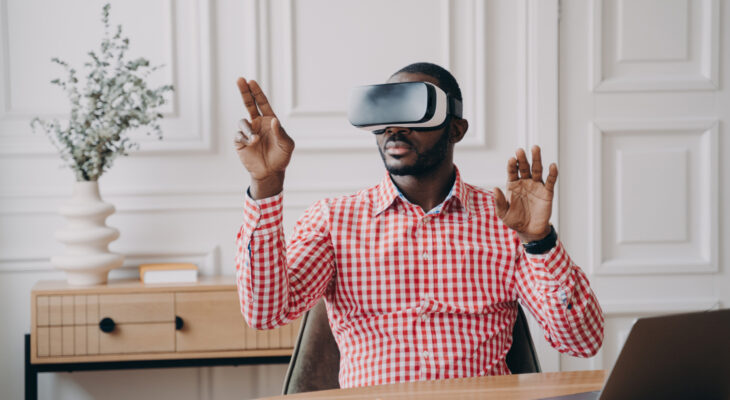Extended Reality (XR) experiences can be scalable, experiential, and deeply immersive. If designed appropriately, they can result in increased engagement, improved understanding, and enhanced retention.
Different technologies can immerse users in various degrees of reality, ranging from purely physical reality to purely virtual environments. On one end of the spectrum is the real world as people experience it every day. On the other end, there is a fully virtual environment, in which the user is immersed entirely in a synthetic environment, with all information from the real world being blocked.
Immersive, XR Experiences
XR is an umbrella term for immersive technologies in which the user’s experience is digitally modified, and augmented reality (AR) and virtual reality (VR) are the most commonly utilized types of XR.
Impact on Online Teaching & Learning
The XR team at the Center for Academic Innovation investigates questions like:
- How do we create online learning experiences with XR?
- What do successful implementations of XR technology in higher education look like?
- What are the benefits, challenges, and impacts of how we teach and learn with XR?
What do we offer U-M faculty?
The XR team at CAI is tasked with integrating XR into residential and online curricula and creating innovative public/private partnerships.
Support for U-M faculty
- Consultations on the use of XR in teaching and learning
- Speaker events and an annual XR Summit to connect with academic and industry experts
- Funding opportunities for integrating or researching XR in residential curricula during funding cycles
- Licenses to select XR tools (Uptale, Sketchfab)
- A lending library of Quest VR headsets, Hololens MR headsets, and 360° cameras
- Demos and classes using XR at 317 Maynard
- Tours of the XR Studio, featuring an LED screen that enables virtual production, a film making technique that combines real-time digital elements with physical production
- Assistance locating/hiring student support for faculty projects
Consult with us
- Recognize different types, strengths, and weaknesses of extended reality (XR) technologies
- Brainstorm potential XR solutions to common teaching and learning challenges
- Consider how XR technologies can impact different audiences.
- Identify challenges related to implementing XR in higher ed, including access and accessibility issues
- Advise on purchase of equipment & sourcing student support for projects
Contact Us
If your online course learning objectives lead you to spaces that would be hard, unwise, or too costly to visit in real life, then consider discussing an XR project with the CAI team.
Contact the XR team to schedule a consultation or request information.



